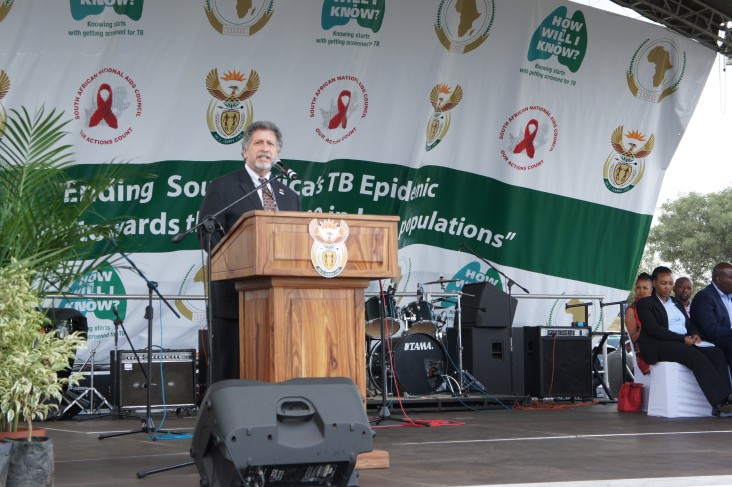
Good morning and thank you on behalf of the United States government and other international development partners for the opportunity to participate in today’s event.
It is easily seen from the amazing turnout here today that Tuberculosis control remains a priority for us all.
As we have already heard this morning, South Africa is burdened by one of the most severe TB epidemics in the world. Additionally, South Africa has the greatest burden of HIV-infected individuals. And, as we all know, the TB and HIV epidemics are fueling each other and few places at risk more than here in Lephalale.
TB and HIV co-infection remains a priority focus for the U.S. government, and continued emphasis is placed on this dual burden through PEPFAR, the U.S. President’s Emergency Plan for AIDS Relief and efforts of USAID the U.S. Agency for International Development and US CDC the U.S. Centers for Disease Control and Prevention.
The U.S. government supports South Africa’s National TB Control Program, both directly through PEPFAR and other activities, and indirectly through our funding to the Global Fund to Fight AIDS, TB and Malaria. I’m honored to speak today on behalf of this wide alliance of International Development Partners.
South Africa has led the world in the implementation of a wide range of innovative approaches to prevent, diagnose, and treat the disease, from early adoption of the GeneXpert diagnostic platform, through its commitment to addressing TB among prisoners and miners, to ambulatory care of multidrug-resistant tuberculosis patients.
Just last week in Washington D.C., at an even earlier World TB Day event, USAID Washington presented Minister Motsoaledi with an Achievement Award, in recognition of South Africa’s outstanding work to combat TB.
In recent years, South Africa has not only been a trailblazer in TB care and treatment, but in its efforts to utilize new diagnostics to identify multidrug-resistant tuberculosis and extensively drug-resistant tuberculosis, simplify access to care, and rapidly incorporate new drugs into its regimens.
I’m proud that PEPFAR, USAID, CDC, and many other development partners have been strong partners with South Africa in the fight against TB. Despite great success, there is still so much more to do, here in Lephalale, Waterberg and all our target municipalities and provinces.
USAID’s support for TB screening builds on previous USAID investments, and draws upon the successful national HIV testing campaign that was led by the honorable President Jacob Zuma, together with the Minister of Health, Dr. Aaron Motsoaledi.
Mobilizing leaders at national, provincial and community level is one key to promoting the uptake of health services amongst South Africans.
In addition to mobilizing political and community leadership, religious, traditional, business and labor leaders, as well as civil society and the private sector, are important stakeholders in helping to improve health outcomes.
With TB being the leading cause of death in South Africa, every part of society must pitch in and help.
On World TB Day, a number of TB Ambassadors from the world of entertainment, sports, media and various sectors will add their voices to encourage communities to get screened for TB.
I am proud to confirm that the U.S. government will continue support for the South African Government’s priorities for TB, just as we are working through PEPFAR to advance its priorities for HIV and AIDS.
Both programs will increasingly focus to target the highest burden, most challenging areas of the country, responding to the greatest needs.
Innovation is a hallmark of U.S. assistance in the health sector.
We are pleased that the U.S. government partnership with the South African Government in research is flourishing, and driving an innovation agenda across the health sector, to help us achieve the 90-90-90 goals.
Our collaborative research programs, including those supported by the U.S. National Institutes of Health, address priority issues from new TB drug regimens to HIV vaccines. What we’re learning together here has global implications, well beyond the borders of South Africa, giving hope to millions of men, women and children who will lead a longer, healthier life because of these important innovations and discoveries.
One ongoing clinical trial is testing whether we can shorten the treatment regimens for multidrug-resistant TB, by investigating whether a nine-month course of treatment can prove as effective as the standard 24-month regimen that’s now used.
And then the second phase of this study, now being developed, will test a six-month treatment regimen, as well as an all-oral treatment, pushing the envelope even more on dealing with TB.
USAID has worked closely with the National Department of Health to develop a new, $65 million, five-year follow-on TB assistance project, which has just been awarded. We are pleased that the University Research Corporation, or URC, will continue to deliver this assistance in collaboration with the National TB Program. URC’s mission is to provide innovative, evidence-based solutions to health and social challenges worldwide.
This technical assistance activity will, among other things, focus on the priorities for TB championed by Minister Motsoaledi and address objectives contained in the U.S. White House’s National Action Plan for Combating Multidrug-Resistant TB.
This assistance is in addition to the $37.5 million that the U.S. government invests on average each year through the PEPFAR program for USAID and CDC to respond to TB/HIV co-infection.
I am confident that our partnerships will generate further innovations and help us all “leapfrog” to the most effective solutions.
The political will and leadership demonstrated by today’s event underscore precisely what is required to help us:
- reach every person with TB,
- cure those in need of treatment, and
- prevent new infections.
Once again, I applaud Minister Motsoaledi, Deputy President Ramaphosa and the South African Government for their commitment to the fight.
We look forward to continuing to work in partnership -- to support your efforts to change the lives of millions of men, women, and children for the better.
Thank you.







Comment
Make a general inquiry or suggest an improvement.